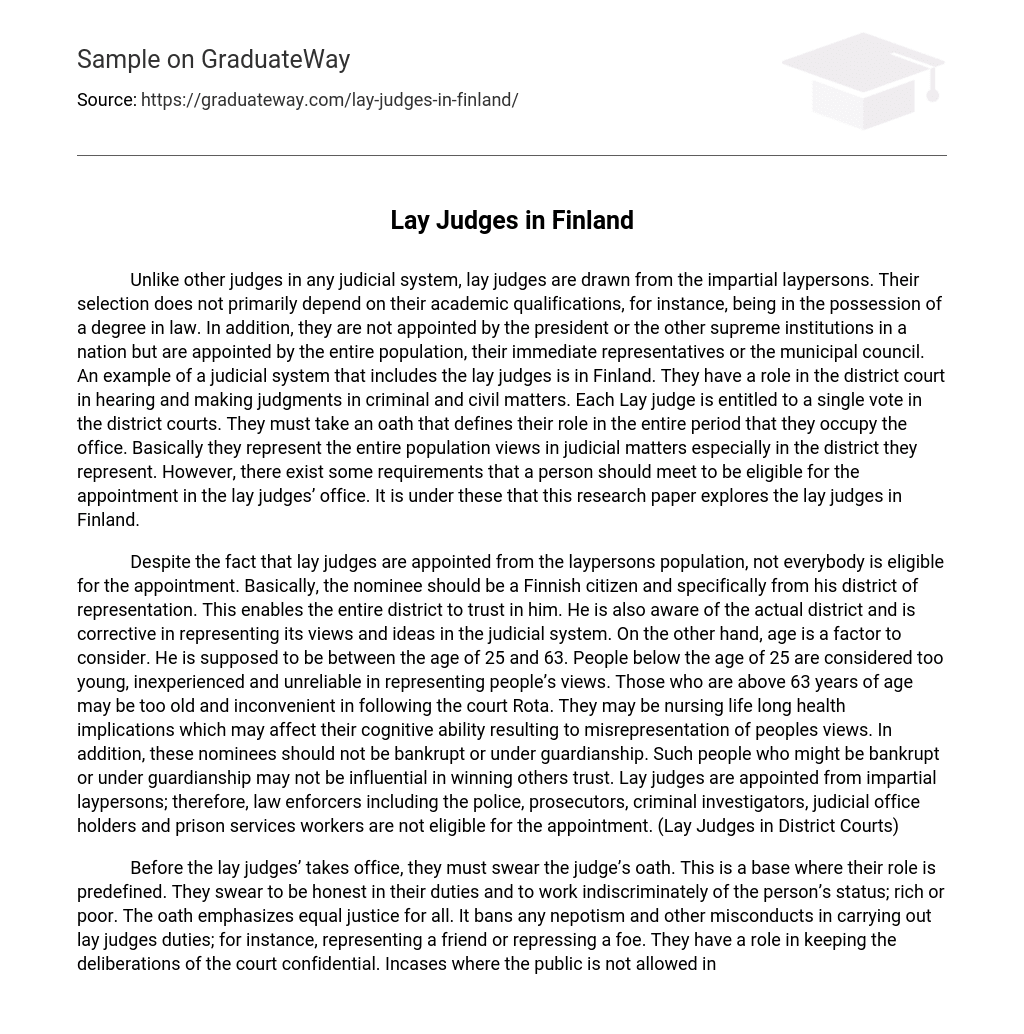Unlike other judges in any judicial system, lay judges are drawn from the impartial laypersons. Their selection does not primarily depend on their academic qualifications, for instance, being in the possession of a degree in law. In addition, they are not appointed by the president or the other supreme institutions in a nation but are appointed by the entire population, their immediate representatives or the municipal council. An example of a judicial system that includes the lay judges is in Finland. They have a role in the district court in hearing and making judgments in criminal and civil matters. Each Lay judge is entitled to a single vote in the district courts. They must take an oath that defines their role in the entire period that they occupy the office. Basically they represent the entire population views in judicial matters especially in the district they represent. However, there exist some requirements that a person should meet to be eligible for the appointment in the lay judges’ office. It is under these that this research paper explores the lay judges in Finland.
Despite the fact that lay judges are appointed from the laypersons population, not everybody is eligible for the appointment. Basically, the nominee should be a Finnish citizen and specifically from his district of representation. This enables the entire district to trust in him. He is also aware of the actual district and is corrective in representing its views and ideas in the judicial system. On the other hand, age is a factor to consider. He is supposed to be between the age of 25 and 63. People below the age of 25 are considered too young, inexperienced and unreliable in representing people’s views. Those who are above 63 years of age may be too old and inconvenient in following the court Rota. They may be nursing life long health implications which may affect their cognitive ability resulting to misrepresentation of peoples views. In addition, these nominees should not be bankrupt or under guardianship. Such people who might be bankrupt or under guardianship may not be influential in winning others trust. Lay judges are appointed from impartial laypersons; therefore, law enforcers including the police, prosecutors, criminal investigators, judicial office holders and prison services workers are not eligible for the appointment. (Lay Judges in District Courts)
Before the lay judges’ takes office, they must swear the judge’s oath. This is a base where their role is predefined. They swear to be honest in their duties and to work indiscriminately of the person’s status; rich or poor. The oath emphasizes equal justice for all. It bans any nepotism and other misconducts in carrying out lay judges duties; for instance, representing a friend or repressing a foe. They have a role in keeping the deliberations of the court confidential. Incases where the public is not allowed in the proceedings, they have a role in keeping the progress of the proceedings confidential. In addition, they have a role in keeping the court’s ruling confidential until the judgment statement is made public. They are required to follow the courts Rota, the proceedings, the hearing and the judgment. In situations where they must be absent, they have a role in informing the district court in advance. However, lay judges are only required to serve for 12days in a year which allows them to conveniently serve else where as full time employee and carryout their daily duties. Competitive remuneration is offered to them. (Lay Judges in District Courts)
They have a range of responsibilities basically in district judicial decisions making. They are the public officials representing the views of the people in the judicial system. They participate in criminal case judgments and other civil related cases. They are entitled to an individual single vote in decision making in the courts. (Lay Judges in District Courts)
The integration of lay judges in any judicial system is necessary. A dictatorial free society is one that represents people’s view in all decisions making. Lay judges limits public-judicial system conflict and is advisable not only in Finland but in other societies in the world. However, honesty and commitment are important factors to consider in any lay judge appointment and in their contributions.
Reference:
Lay Judges in District Courts. The Brochures of the Ministry of Justice. Retrieved on Saturday, November 15, 2008 from www.om.fi/14451.htm





